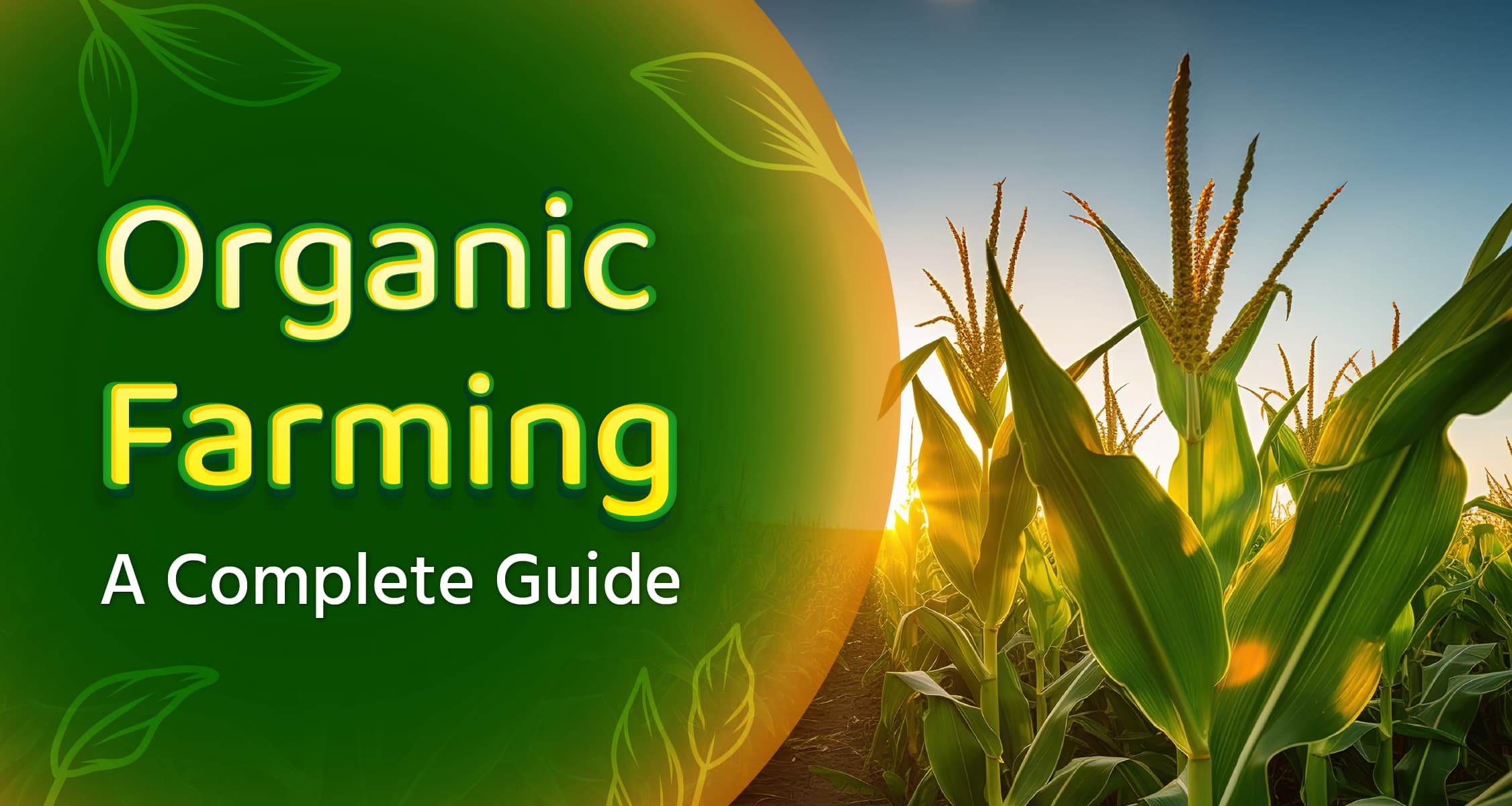Organic Farming: A Complete Guide

Organic farming is an impressive method of producing crops naturally and organically. In this approach, natural fertilizers such as manure and compost are used, while synthetic pesticides and fertilizers are avoided. This process promotes soil health and biodiversity through crop rotation and cover cropping. Organic farming aims to produce food in a sustainable and environmentally friendly manner, while also considering the health and well-being of the soil, plants, animals, farmers, and end-consumers.
How to do Organic Farming?
- Soil Preparation: The fertility of the soil is increased by using organic manure, cow dung, compost, etc. Green manure crops like sun hemp, moong, urad, etc. are sown and then mixed into the soil.
- Seed Selection: Seeds are selected from those produced through organic methods. Seeds are treated with organic substances like neem extract and cow urine.
- Sowing and Transplanting: Sowing is done at the right time and distance. Adequate spacing between plants is maintained to ensure they stay healthy and grow well.
- Organic Manure and Pesticides: Neem oil, cow urine, extracts of carrot grass, garlic, and chili are used. Compost, vermicompost, green manure, and cow dung manure are also utilized.
- Crop Management: Proper irrigation, weeding, and timely use of organic manure and pesticides are carried out for crop care. Mixed cropping and crop rotation are practiced to maintain soil fertility and reduce pest infestation.
- Harvesting and Storage: Crops should be harvested at the right time and stored in a safe and clean place using organic methods.
Benefits of Organic Farming
Healthy Food: Organic products contain more nutrients and are beneficial for health.
- Safe for Farmers: The absence of chemicals prevents adverse health effects on farmers.
- More Sustainable: Organic farming keeps the soil healthy and does not pollute the environment.
- Better Taste: Organic crops are more flavorful.
- Higher Demand: There is greater demand and higher prices for organic products in the market.
- Economic Improvement: Organic farming creates employment opportunities.
- Pollution-Free: Organic farming does not cause environmental pollution.
- Soil Fertility: It improves soil structure and fertility.
- Disease Resistance: Organic products enhance disease resistance in humans and animals.
- Cost Reduction: It reduces expenses on chemicals.
- Increased Income: The higher prices of organic crops increase farmers' income.
- Water Retention Capacity: It enhances the soil's water retention capacity.
- Waste Utilization: Waste is used as compost.
- Excellent Quality: Organic crops are of very high quality.
- International Market: Organic products fetch higher prices in the international market.
- Organic Matter: Organic farms contain sufficient amounts of organic matter.
- Greenhouse Gas Emissions: Organic farming reduces greenhouse gas emissions and water pollution.
- Biodiversity Conservation: Organic farming does not harm beneficial insects and organisms, thus preserving biodiversity.
Disadvantages of Organic Farming
- Higher Costs: Organic farming requires more effort and higher costs.
- Lower Yields: Organic crops are more susceptible to pests and diseases, which can lead to lower yields, if not cultivated properly.
- Certification Issues: To sell organic products, strict certification standards must be met, which can be complex, expensive, and time-intensive.
Organic Inputs for Organic Farming
- Organic inputs play a crucial role in organic farming. Organic fertilizers include vermicompost, bio-gas slurry, green manure, bio-fertilizers, cow dung manure, pit compost, and poultry manure. These fertilizers help in improving soil fertility, maintaining balanced nutrients, and preserving soil health.
- Organic pesticides include cow urine, neem leaf extract, buttermilk, chili/garlic, wood ash, neem, and karanja cake. These aid in preventing pest and disease infestations and enhance plant resistance. Thus, appropriate fertilizers and pesticides in organic farming are essential components for the growth and health of crops in a natural way.
Would you like to do organic farming? If yes, let us know by commenting. Follow the 'Krishi Gyan' channel now for interesting and important information like this. If you liked this post, please like it and share it with your fellow farmers.
Frequently Asked Questions (FAQs)
Q: What are the types of organic farming?
A: There are two main types of organic farming. Pure organic farming avoids all synthetic chemicals and uses nutrients and pesticides from natural sources. Integrated organic farming combines nutrient and pest management, meeting ecological standards and economic demands.
Q: What are the benefits of organic farming?
A: There are several benefits to farming using organic methods. This approach not only reduces farming costs but also increases farmers' income. Additionally, due to the high demand for organic products, there is fluctuation in their prices in international markets. It attracts increasing interest from environmentally conscious consumers, particularly in foreign markets.
Q: What is organic farming?
A: Organic farming, also known as organic agriculture, is a type of farming that avoids the use of synthetic fertilizers, pesticides, herbicides, and other artificial chemicals. In this system, organic fertilizers, crop rotation, and biological pest control are used to enhance soil fertility and productivity.
Q: How is organic farming done?
A: In organic farming, organic fertilizers such as compost, vermicompost, green manure, biofertilizers, ash-based fertilizers, and clay pot manure are used instead of synthetic fertilizers.
जारी रखने के लिए कृपया लॉगिन करें

फसल चिकित्सक से मुफ़्त सलाह पाएँ
